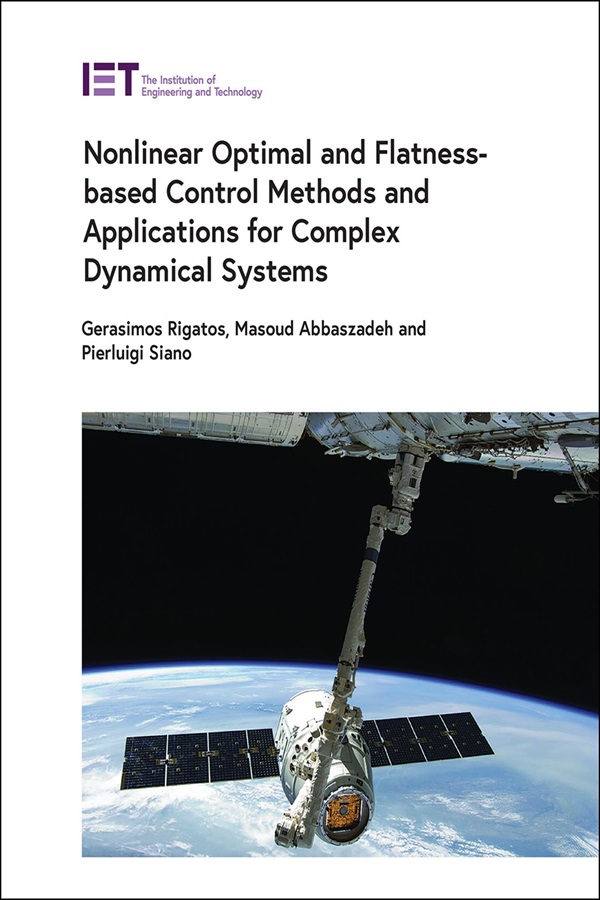- Agricultural Engineering and Technology
- Applied Physics
- Built Environment
- Computing and Networks
- Control, Robotics and Sensors
- Electrical Regulations
- Electromagnetics and Radar
- Energy Engineering
- Healthcare Technologies
- History and Management of Technology
- IET Codes and Guidance
- Manufacturing
- Materials, Circuits and Devices
- Model Forms
- Security
- Telecommunications
- Transportation

Nonlinear Optimal and Flatness-based Control Methods and Applications for Complex Dynamical Systems
by Gerasimos Rigatos, Masoud Abbaszadeh, Pierluigi Siano
Robotics, mechatronics and autonomous systems can exhibit complex nonlinear dynamics which can lead to unsatisfactory transients and deviation from setpoints or even to instability. A standard approach in the control of these systems had been the concept of diffeomorphisms to bring a system into a linear form. However, these methods are not straightforward and result in complicated state-space model transformations. In this monograph, new methods have been investigated which are not constrained by the shortcomings of global linearization-based control schemes. They can be implemented in a computationally simple manner, are followed by global stability proofs, and perform better than previous optimal control approaches for a wider class of nonlinear dynamical systems and applications.
In this monograph, the authors present two main proven control methods: the nonlinear optimal (H-infinity) control method, and the flatness-based control approach. These methods have shown to be better suited than previous standard approaches in solving control issues, and can be used in a wide class of dynamical systems. They can have a broad range of applications in mechatronics, industrial robotics, space robotics, robotic cranes and pendulums, autonomous vehicles, aerospace systems and satellites, power electronics, biosystems and financial systems.
This very comprehensive monograph is a valuable resource for academic researchers and engineers working on control systems and estimation methods, and university staff and graduate students in the fields of control and automation, robotics and mechatronics, electrical engineering, electric power systems and power electronics, biosystems, computer science, financial systems, and physics. The monograph is also a very useful reference for skilled technical professionals developing real world applications.
About the Author
Gerasimos Rigatos is a research director at the Industrial Systems Institute in Greece. He leads research cooperation projects in the areas of nonlinear control, nonlinear filtering, and control of distributed parameter systems. He has been a visiting professor at Université Paris XI, France; Ecole Centrale de Nantes, France, Harper-Adams University College, UK; University of Northumbria, UK; and University of Salerno, Italy. He is a senior member of IEEE and a member and CEng of the IET. He holds an editor's position for the Journal of Information Sciences, the Journal of Advanced Robotic Systems, and the SAE Journal of Electrified Vehicles. He received his PhD degree from the Department of Electrical and Computer Engineering of the National Technical University of Athens (NTUA), Greece.
Masoud Abbaszadeh is a principal research engineer and technical leader of the Cyber-Physical Security & Resilience portfolio at GE Vernova Research Center, NY, USA. He is also an adjunct professor at Rensselaer Polytechnic Institute, NY, USA. His research interests include estimation and detection theory, robust and nonlinear control, and machine learning with applications in cyber-physical resilience and autonomy. He has published 4 books, over 170 peer reviewed articles, and over 80 issued or pending patents. He is an associate editor of IEEE Transactions on Control Systems Technology, and a member of IEEE CSS Conference Editorial Board. He received his BSc, MSc, and PhD degrees in Electrical and Computer Engineering from Amirkabir University of Technology (Iran), Sharif University of Technology (Iran), and University of Alberta (Canada), respectively.
Pierluigi Siano (M'09-SM'14) received an MSc degree in electronic engineering and a PhD degree in information and electrical engineering from the University of Salerno, Salerno, Italy, in 2001 and 2006, respectively. He is a full professor of electrical power systems and scientific director of the Smart Grids and Smart Cities Laboratory with the Department of Management & Innovation Systems, University of Salerno. His research activities are centered on demand response, energy management, the integration of distributed energy resources in smart grids, and electricity markets, as well as the planning and management of power systems. In these research fields, he has co-authored more than 800 articles, including more than 400 international journals that received in Scopus more than 24,000 citations with an H-index equal to 75. Since 2019, he has been awarded as a Highly Cited Researcher in Engineering by the Web of Science Group. He has been the Chair of the IES TC on Smart Grids. He is an editor for the Power & Energy Society Section of IEEE Access, IEEE Transactions on Power Systems, IEEE Transactions on Industrial Informatics, IEEE Transactions on Industrial Electronics, and IEEE Systems.
Publication Year: 2025
Pages: 894
ISBN-13: 978-1-83953-819-3
Format: HBK
